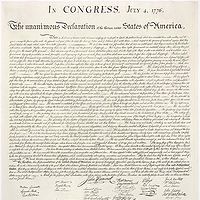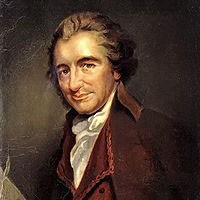The Declaration of Independence holds immense historical significance, serving as a cornerstone of American identity and a beacon of liberty worldwide. At WHY.EDU.VN, we unpack the document’s lasting impact. This exploration delves into its philosophical underpinnings, its immediate effects, and its enduring legacy, emphasizing its contribution to human rights and self-governance, addressing the question of its importance, its historical context, and its global influence.
1. Understanding the Core Significance of the Declaration
The Declaration of Independence, adopted on July 4, 1776, was more than a mere announcement of separation from British rule. It was a bold assertion of fundamental human rights and the right to self-governance. Its significance lies in several key aspects:
- Statement of Principles: It articulated universal principles of equality, liberty, and the pursuit of happiness, which resonated far beyond the American colonies.
- Justification for Revolution: It provided a detailed list of grievances against King George III, justifying the colonists’ decision to revolt against British tyranny.
- Foundation for a New Nation: It laid the groundwork for a new nation based on popular sovereignty and the consent of the governed.
- Global Impact: It inspired movements for independence and self-determination around the world.
2. Historical Context: The Road to Independence
To fully appreciate the significance of the Declaration, it’s crucial to understand the historical context that led to its creation.
2.1. Growing Tensions Between Britain and the Colonies
Following the French and Indian War (1754-1763), Great Britain sought to exert greater control over its American colonies and recoup the costs of the war. This led to a series of unpopular policies, including:
- Taxation Without Representation: Acts like the Stamp Act and the Townshend Acts imposed taxes on the colonies without their consent or representation in the British Parliament.
- Restrictions on Trade: The Navigation Acts restricted colonial trade, forcing colonists to trade primarily with Britain on unfavorable terms.
- Military Occupation: British troops were stationed in the colonies, and the Quartering Act required colonists to provide them with housing and supplies.
2.2. Colonial Resistance and the Rise of Revolutionary Sentiment
The colonists resisted these policies through boycotts, protests, and acts of defiance, such as the Boston Tea Party. Key events that fueled revolutionary sentiment included:
- The Boston Massacre (1770): British soldiers fired on a crowd of protesters, killing several colonists.
- The Battles of Lexington and Concord (1775): Armed conflict broke out between British troops and colonial militias, marking the start of the American Revolutionary War.
- Thomas Paine’s “Common Sense” (1776): This pamphlet eloquently argued for American independence, swaying public opinion in favor of separation from Britain.
3. Key Themes and Philosophies Embodied in the Declaration
The Declaration of Independence is a masterpiece of political thought, drawing upon Enlightenment ideals and articulating a vision of government based on natural rights and popular sovereignty.
3.1. Natural Rights: Life, Liberty, and the Pursuit of Happiness
The Declaration famously proclaims that all men are created equal and endowed with certain unalienable rights, including life, liberty, and the pursuit of happiness. These rights are inherent and cannot be legitimately taken away by any government. This concept of natural rights was heavily influenced by Enlightenment philosophers like John Locke, who argued that individuals possess inherent rights to life, liberty, and property. The Declaration’s emphasis on natural rights has had a profound impact on the development of human rights law and continues to inspire movements for freedom and equality around the world.
3.2. Popular Sovereignty: Government by Consent of the Governed
The Declaration asserts that governments derive their just powers from the consent of the governed. This principle of popular sovereignty means that political authority ultimately resides in the people, who have the right to alter or abolish a government that becomes destructive of their rights. This idea challenged the traditional notion of divine right of kings and established a new paradigm of government based on the will of the people. The Declaration’s emphasis on popular sovereignty has been a cornerstone of democratic thought and has influenced the development of representative governments around the world.
3.3. Right to Revolution: Justifying Resistance to Tyranny
The Declaration asserts the right of the people to alter or abolish a government that becomes destructive of their rights. This right to revolution is not to be taken lightly, but it is a necessary safeguard against tyranny. The Declaration argues that the British government had become tyrannical by repeatedly violating the colonists’ rights and that the colonists had exhausted all other means of redress. Therefore, they were justified in declaring their independence and establishing a new government that would protect their rights. This concept of the right to revolution has been invoked throughout history by movements seeking to overthrow oppressive regimes and establish more just and equitable societies.
4. Immediate Impact: Uniting the Colonies and Securing Foreign Support
The Declaration of Independence had a number of immediate and significant effects:
4.1. Unifying the Colonies in a Common Cause
By declaring independence, the Declaration united the 13 colonies in a common cause, transforming a disparate group of colonies into a unified nation committed to fighting for its freedom. It provided a clear and compelling statement of purpose that galvanized support for the revolution and inspired colonists to sacrifice for the cause of independence. Without the Declaration, it is unlikely that the colonies would have been able to overcome their differences and successfully wage war against Great Britain.
4.2. Gaining International Recognition and Support
The Declaration was crucial in gaining international recognition and support for the American cause. By declaring themselves an independent nation, the American colonists were able to seek alliances with foreign powers, most notably France, which provided crucial military and financial assistance that was essential to the American victory in the Revolutionary War. The Declaration also signaled to other European powers that the American colonies were serious about their independence and that supporting them would be a worthwhile investment.
4.3. Shifting the Focus of the War
The Declaration shifted the focus of the war from a dispute over rights to a struggle for national independence. It transformed the conflict from a rebellion against British rule into a war between two sovereign nations. This shift in focus helped to legitimize the American cause in the eyes of the world and made it more difficult for the British to portray the colonists as mere rebels.
5. Lasting Legacy: Inspiration for Freedom and Democracy Worldwide
The Declaration of Independence has had a profound and lasting impact on the world, inspiring movements for freedom and democracy in countless countries.
5.1. Influence on the French Revolution
The Declaration’s ideals of liberty, equality, and fraternity resonated deeply with the French people, who were suffering under an oppressive monarchy. The French Revolution, which began in 1789, drew heavily upon the Declaration’s principles and sought to establish a government based on popular sovereignty and the protection of individual rights.
5.2. Inspiration for Latin American Independence Movements
In the early 19th century, many Latin American countries declared their independence from Spain and Portugal. The Declaration of Independence served as a model for these independence movements, inspiring them to fight for their own self-determination and to establish governments based on the principles of liberty and equality.
5.3. A Guiding Light for Human Rights Movements
Throughout the 20th and 21st centuries, the Declaration of Independence has served as a guiding light for human rights movements around the world. Its emphasis on natural rights and the right to self-determination has inspired activists and reformers to fight for freedom, equality, and justice in their own countries.
6. Criticisms and Controversies: Addressing the Limitations of the Declaration
While the Declaration of Independence is a seminal document in American history, it has also been subject to criticism and controversy.
6.1. Hypocrisy of Slavery
The Declaration’s proclamation that all men are created equal was a stark contradiction to the reality of slavery in the American colonies. Many of the signatories of the Declaration were slaveholders themselves, and the Declaration did not address the issue of slavery, which would continue to plague the United States for nearly a century.
6.2. Exclusion of Women and Other Groups
The Declaration’s focus on “men” excluded women and other groups from its promise of equality. Women were denied basic rights, such as the right to vote, and were subject to legal and social discrimination. Native Americans were also excluded from the Declaration’s promise of equality, as they were not considered citizens of the United States.
6.3. Limited Scope of “Happiness”
The Declaration’s reference to the “pursuit of happiness” has been interpreted in various ways. Some argue that it refers to the right to pursue economic prosperity, while others argue that it refers to the right to pursue personal fulfillment. However, the Declaration does not define what constitutes happiness, which has led to ongoing debates about its meaning and application.
7. Modern Relevance: The Declaration in Contemporary Society
Despite its limitations, the Declaration of Independence remains a relevant and inspiring document in contemporary society.
7.1. Foundation for American Ideals
The Declaration continues to serve as a foundation for American ideals of liberty, equality, and democracy. It is a reminder that the United States was founded on the principle that all people are created equal and that governments derive their just powers from the consent of the governed.
7.2. Source of Inspiration for Social Justice Movements
The Declaration continues to inspire social justice movements in the United States and around the world. Its emphasis on natural rights and the right to self-determination has been invoked by activists fighting for civil rights, women’s rights, LGBTQ+ rights, and other causes.
7.3. Framework for International Human Rights
The Declaration has served as a framework for international human rights law. Its principles have been incorporated into the Universal Declaration of Human Rights and other international treaties, which seek to protect the rights of all people regardless of their nationality, race, religion, or gender.
8. The Declaration’s Influence on Key Historical Events
The Declaration of Independence has had a profound impact on key historical events, shaping the course of American and world history. Here are some notable examples:
| Event | Description | Declaration’s Influence |
|---|---|---|
| American Revolution (1775-1783) | The war for American independence from British rule. | The Declaration provided the justification for the revolution, articulating the colonists’ grievances and their right to self-governance. It also helped to unify the colonies and gain international support for their cause. |
| French Revolution (1789-1799) | A period of social and political upheaval in France that overthrew the monarchy and established a republic. | The Declaration’s ideals of liberty, equality, and fraternity resonated deeply with the French people, who sought to overthrow their own oppressive regime. The Declaration served as a model for the French Declaration of the Rights of Man and of the Citizen. |
| Latin American Independence Movements (early 19th century) | A series of revolutions that led to the independence of most Latin American countries from Spanish and Portuguese rule. | The Declaration inspired Latin American revolutionaries to fight for their own self-determination and to establish governments based on the principles of liberty and equality. |
| Civil Rights Movement (1950s-1960s) | A movement in the United States that sought to end racial segregation and discrimination against African Americans. | The Declaration’s promise of equality for all men was invoked by civil rights activists to challenge racial segregation and discrimination. Martin Luther King Jr., for example, frequently quoted the Declaration in his speeches and writings. |
| Anti-Apartheid Movement (20th century) | A global movement that sought to end apartheid, a system of racial segregation and discrimination in South Africa. | The Declaration’s principles of equality and self-determination inspired anti-apartheid activists to fight for the rights of black South Africans. |


9. FAQ: Addressing Common Questions About the Declaration
Here are some frequently asked questions about the Declaration of Independence:
- Who wrote the Declaration of Independence? Thomas Jefferson was the primary author, but it was reviewed and edited by a committee including John Adams and Benjamin Franklin.
- What are the main ideas of the Declaration? Natural rights, popular sovereignty, and the right to revolution.
- When was the Declaration adopted? July 4, 1776.
- Why did the colonists declare independence? To escape British tyranny and establish a government that protected their rights.
- Did everyone support the Declaration? No, there were loyalists who remained loyal to the British crown.
- What impact did the Declaration have on slavery? It exposed the hypocrisy of slavery in a nation founded on the principle of equality.
- How does the Declaration relate to the Constitution? It laid the philosophical foundation for the Constitution, which established the structure of the U.S. government.
- Is the Declaration still relevant today? Yes, its principles continue to inspire movements for freedom and democracy around the world.
- Where can I see the original Declaration? It is on display at the National Archives in Washington, D.C.
- How did the Declaration influence other countries? It served as a model for independence movements and constitutions in many other nations.
10. Delving Deeper: Resources for Further Exploration
For those seeking a more comprehensive understanding of the Declaration of Independence, here are some valuable resources:
- The National Archives: Offers a wealth of primary source documents, including the original Declaration.
- The Library of Congress: Provides access to historical collections and exhibits related to the Declaration.
- Academic Journals: Scholarly articles offer in-depth analysis of the Declaration’s historical context, philosophical underpinnings, and lasting legacy.
- Biographies of the Founding Fathers: Exploring the lives and ideas of key figures like Thomas Jefferson, John Adams, and Benjamin Franklin can provide valuable insights into the creation of the Declaration.
Conclusion: The Enduring Power of an Idea
The Declaration of Independence was a pivotal moment in American and world history. It was a bold declaration of human rights, a justification for revolution, and a foundation for a new nation. While it had its limitations and contradictions, its ideals of liberty, equality, and self-governance continue to inspire people around the world to fight for a better future. The Declaration’s legacy is a testament to the enduring power of an idea – the idea that all people are created equal and endowed with certain unalienable rights.
Do you have more questions about the Declaration of Independence or other historical topics? Visit WHY.EDU.VN, where our team of experts is ready to provide you with detailed answers and insights. We’re located at 101 Curiosity Lane, Answer Town, CA 90210, United States. You can also reach us via WhatsApp at +1 (213) 555-0101. Let why.edu.vn be your go-to resource for reliable and comprehensive information.
